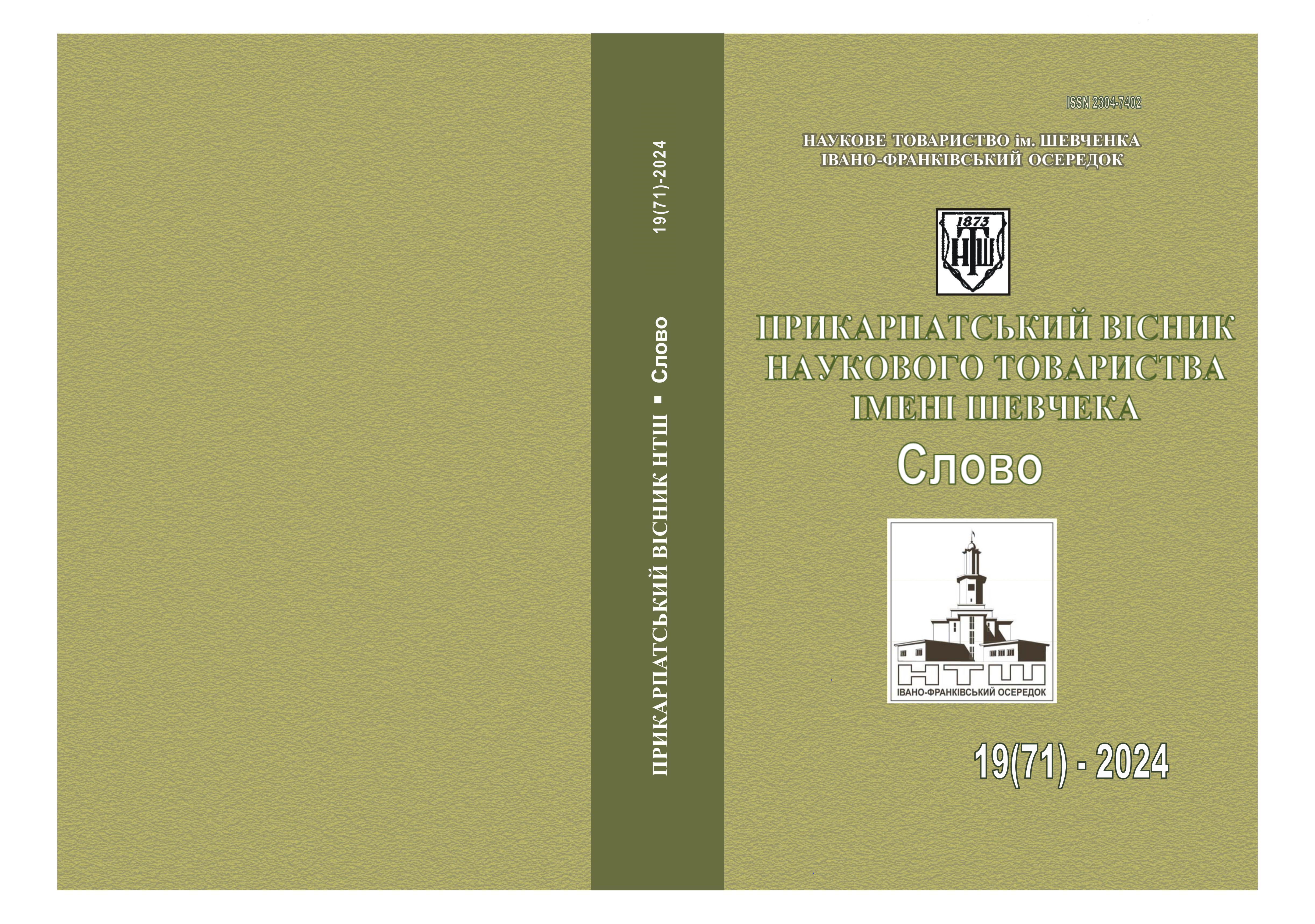THE RANGE OF PROCESS CONCEPTS IN THE UKRAINIAN LANGUAGE (COMPARING TO OTHER SLAVIC LANGUAGES)
DOI:
https://doi.org/10.31471/2304-7402-2024-19(71)-166-177Keywords:
verbal noun, adjectival participle, adverbial participle, impersonal forms ending with -no, -to, infinitive.Abstract
Aim. The article is devoted to hybrid verb forms that have a process meaning and are derived from the formative verb, retaining suffixes and prefixes; to identifying common and distinctive features of the Ukrainian language against the background of other Slavic languages. All of these mixed parts of speech are also united by the category of Slavic aspect, which primarily belongs to the verb. The object of this study is the so-called "hybrid verb forms" (participles, adverbs, infinitives, verbal nouns, forms with -no, -to), which are on the border of several parts of speech, showing syncretism at the morphological and semantic-syntactic levels. The subject of the study is the morphological and semantic-syntactic features of hybrid verb forms that convey process meaning.
Research methodology. The descriptive method was used to outline the terminological ambiguity of hybrid verb forms in Slavic linguistics. The comparative-historical method made it possible to compare and distinguish common and distinctive features of the expression of grammatical categories of hybrid verb forms. The source base was examples taken from the National Corpus of the Polish language and the General Regional Annotated Corpus of the Ukrainian language.
Results. Hybrid verb forms (participles, adverbs, infinitives, verbal nouns and forms with -no, -to (derived from participles) combine features of completely opposite parts of speech - verbal and noun. In Slavic linguistics, these forms are to some extent related to each other by origin, common processual meaning, and grammatical features, but each of the Slavic languages has acquired differences due to its historical development, and thus in some languages hybrid forms are more inclined to verbal forms, and in others to noun forms. The quantitative composition of finite forms in each of the Slavic languages is different and depends on the structure of verbal categories (tense, mood, person), hence the greater number of finite forms in languages with a developed system of tenses (Bulgarian, Macedonian, Serbian, Croatian, Lusatian) and moods (imperative mood in Bulgarian and Macedonian), as well as regular non-personal forms of personal predicates on -no, -to in Polish and Ukrainian.
Scientific novelty. In this paper, the term hybrid verb forms is used for participles, adverbs, infinitives, verbal nouns, and forms with -no, -to (derived from participles). This approach is new, since it is the first time that verb forms are described in a single work on their joint interpretation, especially against the Slavic background.
Practical significance. The article introduces into Ukrainian linguistics a new concept of hybrid verb forms that are united by a common processual meaning. Accordingly, this allows us to consider the above forms from a different angle, taking into account their categorical features.
References
Бэбби Л. К построению формальной теории «частей речи». Новое в зарубежной лингвистике. Современная зарубежная русистика, Вып. XV. 1985. с. 171-203.
Вечорек Д. Глагольность в украинском языке (на фоне глагольности в русском и польском языках). Współczesne tendencje rozwoju języków słowiańskich, T. 2. 1997. s. 86-99.
Вихованець І. Городенська, К.Теоретична морфологія української мови: Академ. грамат. укр. мови. Київ: Унів. вид-во “Пульсари”, 2004.
Вихованець І. Р. Частини мови в семантико-граматичному аспекті. Київ: Наукова думка, 1988.
Гінзбург М. Г. Мовознавче підґрунтя теорії подавання процесових понять в українській фаховій мові. Українська наукова термінологія. Збірник матеріалів науково-практичної конференції „Українська наукова термінологія. Природничі науки”. № 4. 2012. с. 29-39.
Есперсен О. Философия грамматики Москва: Издательство иностранной литератури, 1958.
Масенко Л. Мова і суспільство. Постколоніальний вимір. Київ: КМ Академія, 2004.
Пешковский А. Русский синтаксис в научном освещении. Москва: Языки славянской культуры, 2001.
Пушина Н. И. Неличныe формы глагола в ономасиологическом и когнитивном аспектах. Весник удмуртского университета, Вып. 1. 2009. с. 160-172.
Пчелинцева Е. Э. От глагола к имени: аспектуальность в русских, украинских и польских именах действия, Санкт-Петербург: Наука, 2016.
Смеричинський С. Нариси з української синтакси. Харків: Радянська школа, 1932.
Теория функционльной грамматики. Категории морфологии и синтаксиса в высказывании / под ред. А. В. Бондарка. Санкт-Петербург, 2000.
Dalewska-Greń H. Języki słowiańskie. Warszawa: PWN, 1997.
Jóźwikiewicz P. Ukraińskie rzeczowniki odczasownikowe na -нн(я), -тт(я) – historia, funkcjonowanie, kontrowersje. Roczniki Humanistyczne, Tom LVI (7). 2008. s. 141-149.
Język Polski. Kompendium / pod red. Magdaleny Derwojedowej, Haliny Karaś, Doroty Kopczyńskiej. Warszawa, 2005. 934 s.
Nagórko A. Zarys gramatyki polskiej. Warszawa: PWN, 2007.
Puzynina J. Nazwy czynności we współczesnym języku polskim (słowotwórstwo, semantyka, składnia).Warszawa: PWN, 1969.
Szober S. Gramatyka języka polskiego. Warszawa: PWN, 1969.

